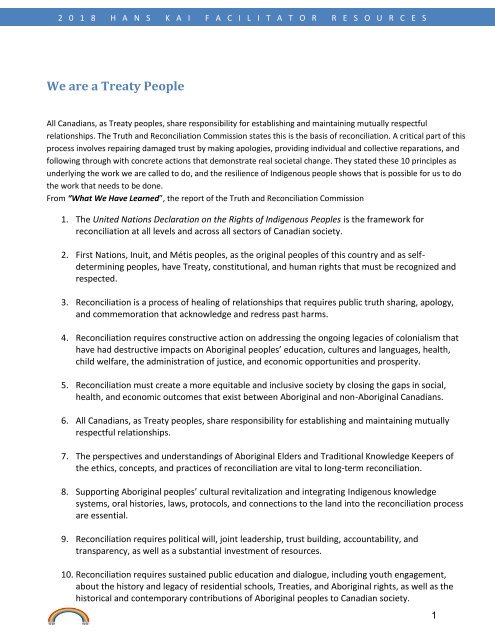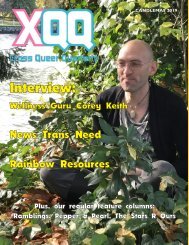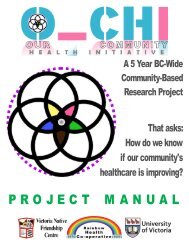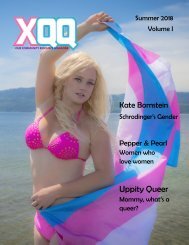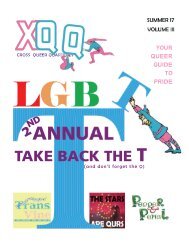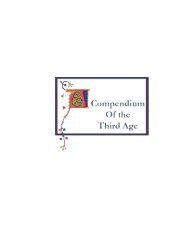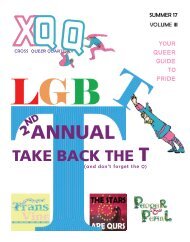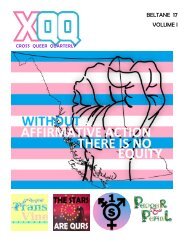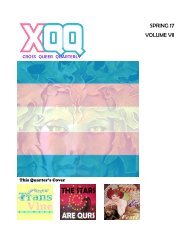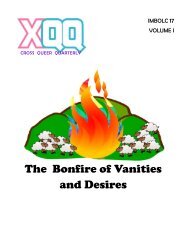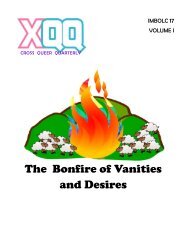2018 Hans Kai Facilitator Resources
- No tags were found...
You also want an ePaper? Increase the reach of your titles
YUMPU automatically turns print PDFs into web optimized ePapers that Google loves.
2 0 1 8 H A N S K A I F A C I L I T A T O R R E S O U R C E S<br />
We are a Treaty People<br />
All Canadians, as Treaty peoples, share responsibility for establishing and maintaining mutually respectful<br />
relationships. The Truth and Reconciliation Commission states this is the basis of reconciliation. A critical part of this<br />
process involves repairing damaged trust by making apologies, providing individual and collective reparations, and<br />
following through with concrete actions that demonstrate real societal change. They stated these 10 principles as<br />
underlying the work we are called to do, and the resilience of Indigenous people shows that is possible for us to do<br />
the work that needs to be done.<br />
From “What We Have Learned”, the report of the Truth and Reconciliation Commission<br />
1. The United Nations Declaration on the Rights of Indigenous Peoples is the framework for<br />
reconciliation at all levels and across all sectors of Canadian society.<br />
2. First Nations, Inuit, and Métis peoples, as the original peoples of this country and as selfdetermining<br />
peoples, have Treaty, constitutional, and human rights that must be recognized and<br />
respected.<br />
3. Reconciliation is a process of healing of relationships that requires public truth sharing, apology,<br />
and commemoration that acknowledge and redress past harms.<br />
4. Reconciliation requires constructive action on addressing the ongoing legacies of colonialism that<br />
have had destructive impacts on Aboriginal peoples’ education, cultures and languages, health,<br />
child welfare, the administration of justice, and economic opportunities and prosperity.<br />
5. Reconciliation must create a more equitable and inclusive society by closing the gaps in social,<br />
health, and economic outcomes that exist between Aboriginal and non-Aboriginal Canadians.<br />
6. All Canadians, as Treaty peoples, share responsibility for establishing and maintaining mutually<br />
respectful relationships.<br />
7. The perspectives and understandings of Aboriginal Elders and Traditional Knowledge Keepers of<br />
the ethics, concepts, and practices of reconciliation are vital to long-term reconciliation.<br />
8. Supporting Aboriginal peoples’ cultural revitalization and integrating Indigenous knowledge<br />
systems, oral histories, laws, protocols, and connections to the land into the reconciliation process<br />
are essential.<br />
9. Reconciliation requires political will, joint leadership, trust building, accountability, and<br />
transparency, as well as a substantial investment of resources.<br />
10. Reconciliation requires sustained public education and dialogue, including youth engagement,<br />
about the history and legacy of residential schools, Treaties, and Aboriginal rights, as well as the<br />
historical and contemporary contributions of Aboriginal peoples to Canadian society.<br />
1


